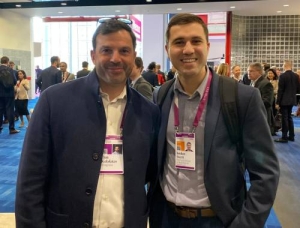
- About
- Education
- Research
- Thought Leadership
- Engagement
- News & Events
Back to Top Nav
Back to Top Nav
Back to Top Nav
Back to Top Nav
Back to Top Nav
By Jordan Swett '19 Tuck '25
I was incredibly fortunate to participate in one of the world's largest conferences focused on energy and climate solutions, CERAWeek 2025, representing The Arthur L. Irving Institute for Energy and Society at Dartmouth. The week was filled with invaluable insights, innovations, and discussions that have deepened my understanding of what the energy transition looks like today, and where it is headed over the next few decades.

Throughout the week, several prominent trends emerged. Geothermal energy is stepping into the spotlight, with advancements in AI-driven site selection and drilling technologies finally unlocking this abundant resource efficiently. Notably, natural hydrogen, or "white hydrogen," presents a groundbreaking opportunity for a sustainable energy future—if safe, effective extraction methods can be developed.
The collaboration between tech giants and energy companies on AI applications is another promising development. These partnerships are essential for optimizing energy transmission, managing demand, and preparing for AI-driven shifts in the industry. Overall, the focus on security, affordability, and environmental impact in the U.S. energy transition resonates strongly amidst a rapidly evolving energy landscape.
Startups at CERAWeek showcased remarkable innovations. From Zanskar Geothermal & Minerals' transformative site discovery methods to LineVision's cost-effective enhancements to power line capacity, it's clear that fresh ideas are paving the way toward a cleaner future. I was particularly excited to see Dartmouth's own Terragia Biofuel, transforming agricultural biomass into affordable biofuels, demonstrating effective engineering for sustainability.
Nuclear energy emerged as a major focus of the conference, recognized as a crucial component for meeting global energy demands. With major corporations including Google and Amazon joining forces with the World Nuclear Association to support tripling global nuclear capacity by 2050, there's a clear recognition of nuclear power's role in ensuring energy security and decarbonization.
The dynamics of the energy sector are shifting, and embracing innovation through strategic partnerships across academia, industry, and government is crucial for driving meaningful progress. Panelists emphasized the urgency of adapting to rapid technological changes and highlighted AI's transformative capacity for data utilization across industries.
On the final day of CERAWeek, the strong bipartisan support for the Inflation Reduction Act caught my attention as a key pillar for ongoing clean energy incentives. Additionally, discussions around U.S.-China dependencies on critical minerals highlight the potential for future breakthroughs in energy production and security.
This week has reinforced the essential role of institutions like Dartmouth in participating in the energy transition, emphasizing that empowering students with direct access to thought leadership and innovation is instrumental in helping us navigate the rapid changes ahead.
CERAWeek 2025 has been an inspiring gathering of global leaders who are dedicated to advancing sustainable energy and climate solutions. I am grateful to have been part of such a pivotal event.
You can also read more about Dartmouth faculty's presentations and panel discussions.